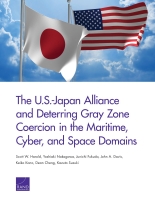by Scott W. Harold, Yoshiaki Nakagawa, Junichi Fukuda, John A. Davis, Keiko Kono, Dean Cheng, Kazuto Suzuki
 How can Washington and Tokyo counteract a determined adversary, such as China, when it is seeking to undermine Japanese control over the Senkakus, intrude into computer networks for the purposes of industrial espionage and national security, and potentially cripple allied space assets in a time of crisis?
How can Washington and Tokyo counteract a determined adversary, such as China, when it is seeking to undermine Japanese control over the Senkakus, intrude into computer networks for the purposes of industrial espionage and national security, and potentially cripple allied space assets in a time of crisis?
How can the allies deter China's gray zone coercion in situations where tit-for-tat strategies are either unavailable or unappealing due to the medium (such as a counterstrike in space)?
The United States and Japan face a dilemma: China is trying to change the status quo in the Indo-Pacific without firing a shot, gradually shifting the strategic playing field through the employment of gray zone coercion, or coercive moves that lie below the threshold that would trigger a military response. China's actions in the maritime, cyber, and (potentially) space domains challenge the status quo in ways that damage the interests of both Japan and the United States and are intended to erode trust in U.S. extended deterrence commitments. The RAND Corporation convened a pair of public conferences where experts from the United States and Japan presented papers focused on the challenges of deterrence by denial and deterrence by punishment in these three domains.
Key Findings
Four Steps to Deterring Gray Zone Coercion
The authors collectively find that the challenges the allies face, while difficult, are not insuperable and require Washington and Tokyo to deter gray zone coercion through four interrelated steps.
First, the allies must stigmatize gray zone coercion through the use of their considerable norm-setting power and international institutional influence.
Second, they should reduce the "anonymity" or "grayness" of the various domains in which China or other actors seek to carry out gray zone coercion by enhancing the sharing of information and intelligence to as great a degree as possible as a way to clarify command-and-control relationships between agents and their principals.
Third, Washington and Tokyo need to maintain conventional preeminence, investing in the ability to deter by denying an adversary, such as China, the outcomes it seeks by defeating any efforts at gray zone or conventional coercion.
Finally, should an adversary seek to carry out gray zone coercion, the authors suggest that the allies also need the ability to deter through punishment, imposing costs on any actor who seeks to coerce them (after the attempt at coercion has been turned back) so as to reinforce the lesson that such efforts carry consequences in other military domains or in economic, political, diplomatic, informational, legal, or institutional areas.
Recommendations
The United States and Japan are particularly well-positioned to mobilize global support for stigmatizing gray zone coercion and should move to reinforce these norms.
Investments in intelligence and agreements aimed at enhancing intelligence- and information-sharing constitute a promising arena for deeper cooperation between the United States and Japan, as well as between the allies and other regional partners such as South Korea, Taiwan, or the Philippines in the maritime domain or other partners in the cyber or space domains.
The allies can further improve their national public-private cooperation on cyber defenses, encouraging greater "cyber hygiene" among the population and mandating it among all defense and critical infrastructure–related private-sector firms.
Deterrence by denial also has a role to play in space. Hardening of targets requires continued efforts to defend ground-based facilities, further enhancements to cybersecurity and efforts to harden other means of two-way communications, as well as improvements to shared or joint situational awareness in space. Satellites and other space assets are best hardened in the limited sense of actions taken on the ground and in the uplinks and downlinks between the space-based assets and their ground-based controllers.
Deterrence by punishment can also be a factor in dissuading countries from pursuing gray zone coercion, including by the use of legal and economic sanctions to impose costs on state, substate, and private-sector actors who engage in gray zone coercion. Individuals and firms can be listed with Interpol, firms can be delisted from stock exchanges and banned from selling in overseas markets, assets can be frozen, visas blocked, and individuals or groups who participate in cyber activities or maritime gray zone coercion could even be targeted on-line.
Table of Contents
Chapter One
Introduction
Chapter Two
Using Land Forces to Deter Maritime Gray Zone Coercion: The Role of the Japan Ground Self-Defense Forces in the Nansei (Ryukyu) Islands
Chapter Three
A Japanese Perspective on the Role of the U.S.-Japan Alliance in Deterring — or, If Necessary, Defeating — Maritime Gray Zone Coercion
Chapter Four
The U.S.-Japan Alliance and Deterrence in Cyberspace
Chapter Five
A Japanese Perspective on Deterrence in Cyberspace Gray Zone Contingencies and the Role of the Japan-U.S. Alliance
Chapter Six
Space Deterrence, the U.S.-Japan Alliance, and Asian Security: A U.S. Perspective
Chapter Seven
A Japanese Perspective on Space Deterrence and the Role of the U.S.-Japan Alliance and Deterrence in Outer Space
Chapter Eight
Conclusion: Leveraging the U.S.-Japan Alliance to Deter Gray Zone Coercion in the Maritime, Cyber, and Space Domains
No comments:
Post a Comment